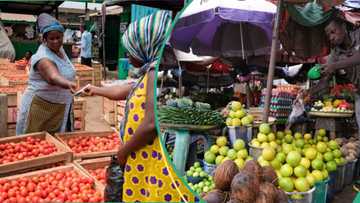Manufacturers Shun Loans, Turn to Other Fund Sources as Interest Rates Go Higher
- Data shows that manufacturers are shunning loan facilities and exploring other fundraising options
- This, according to analysts, is a result of the high interest rates and the multiple challenges that manufacturers already have to deal with
- The stakeholders called on the CBN to moderate its monetary approach in the interest of the manufacturing and agricultural sectors
Don't miss out! Join Legit.ng's Sports News channel on WhatsApp now!
Legit.ng journalist Ruth Okwumbu-Imafidon has over a decade of experience in business reporting across digital and mainstream media.
For the first time in two years, credit to the manufacturing sector declined quarterly in 2024.
Data from CBN shows that credit to the manufacturing sector fell by 6.67% quarter-on-quarter (QoQ) to N8.67 trillion in the third quarter of 2024 (Q3’24), down from N9.29 trillion in the previous quarter (Q2’24).

Source: Getty Images
This marks the first quarterly decline in two years, with the last drop occurring in the third quarter of 2022 (Q3’22).
This is a sign that local manufacturers are now ignoring loans as a source of funding due to higher interest rates.
This trend has been confirmed by industry experts who say that manufacturers are now seeking other funding alternatives or totally postponing capital-intensive business moves.
From April 2022, the Central Bank of Nigeria has raised interest rates several times in a bid to rein in the inflation tides. This move saw interest rates rise from 11.5% to 27.5% over 30 months.
Vanguard reports that following this rise in benchmark interest rates to 27.50%, banks' average lending rates have risen to 31.06%.
A look at the numbers
It is interesting to see from the same data that credit allocation to the manufacturing sector consistently increased from Q3’22 to Q2’24 before reversing in Q3’24. During this period, credit grew by 12.3% QoQ to N5.10 trillion in Q3’22 and by 9.2% to N5.57 trillion in Q4’22.
This growth trend extended into 2023, with credit rising by 1.8% QoQ to N5.67 trillion in Q1’23, by 23.1% to N6.98 trillion in Q2’23, by 5.2% to N7.34 trillion in Q3’23, and by 5.3% to N7.73 trillion in Q4’23.
In 2024, the upward trajectory continued in Q1 with a 12.5% QoQ increase to N8.70 trillion and another 6.8% to N9.29 trillion in Q2’24, before the recent downturn in Q3.
However, this upward trend came to an abrupt end in Q3’24, with credit to the sector declining by 6.67% to N8.67 trillion.
Stakeholder speaks about the issues
Speaking to the challenges on ground, Dr Muda Yusuf, the Chief Executive Officer of the Centre for the Promotion of Private Enterprise (CPPE), noted that manufacturers already have to face a lot of problems operating in Nigeria, and so they are naturally unwilling to take loans at interest rates as high as 3%.
Some of the challenges include the volatile foreign exchange market, which makes it harder to import raw materials, rising energy and power costs, which increase operations costs, and lower sales caused by the consumer’s weak purchasing power.
Yusuf pointed out that the combination of these factors creates a toxic environment for the businesses, and adding high-interest loans to an already bad situation does not appear attractive to them, hence the decision to explore other options.
Yusuf called on the Central Bank of Nigeria (CBN) to moderate its market-driven monetary policies to safeguard the real sector of the economy.
He noted that businesses in manufacturing and agriculture face immense challenges with interest rates exceeding 32% and a depreciating currency that has plunged from nearly N500 per dollar in June 2023 to over N1,600 per dollar under the current approach.
Echoing these concerns, Segun Ajayi-Kadir, Director General of the Manufacturers Association of Nigeria (MAN), pointed out that high lending rates, combined with other economic pressures, have significantly discouraged borrowing for investment in manufacturing activities. Worse still, they have difficulty servicing their existing loans.

Read also
Top sources of Nigeria’s N142 trillion debt emerge as FG repays loans to China, IMF, others
He said;
“When manufacturers produce less, they require less credit, and this will ultimately lead to a decline in credit to the sector”
Mr Tunde Abidoye, Head of Equity Research, FBNQuest Securities, added that the banks are also taking a cautious stance on loans because of the frightening size of non-performing loans in the face of high interest rates.
CBN raises interest rates
In related news, Legit.ng reported that the CBN announced another interest rate increase in November 2024.
The MPC increased the interest rate by 25 basis points from 27.25% to 27.50%.
The increase translated to banks increasing their lending rates to customers while reviewing the rate on existing loans.
This also meant that interest rates on customers' savings accounts were reviewed upwards, making saving more profitable.
Proofread by Kola Muhammed, journalist and copyeditor at Legit.ng
PAY ATTENTION: Сheck out news that is picked exactly for YOU ➡️ find the “Recommended for you” block on the home page and enjoy!
Source: Legit.ng





